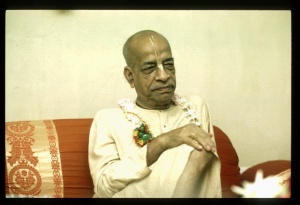SB 7.4.18

A.C. Bhaktivedanta Swami Prabhupada
TEXT 18
- śailā droṇībhir ākrīḍaṁ
- sarvartuṣu guṇān drumāḥ
- dadhāra loka-pālānām
- eka eva pṛthag guṇān
SYNONYMS
śailāḥ—the hills and mountains; droṇībhiḥ—with the valleys between them; ākrīḍam—pleasure grounds for Hiraṇyakaśipu; sarva—all; ṛtuṣu—in the seasons of the year; guṇān—different qualities (fruits and flowers); drumāḥ—the plants and trees; dadhāra—executed; loka-pālānām—of the other demigods in charge of different departments of natural activity; ekaḥ—alone; eva—indeed; pṛthak—different; guṇān—qualities.
TRANSLATION
The valleys between the mountains became fields of pleasure for Hiraṇyakaśipu, by whose influence all the trees and plants produced fruits and flowers profusely in all seasons. The qualities of pouring water, drying and burning, which are all qualities of the three departmental heads of the universe—namely Indra, Vāyu and Agni—were all directed by Hiraṇyakaśipu alone, without assistance from the demigods.
PURPORT
It is said in the beginning of Śrīmad-Bhāgavatam, tejo-vāri-mṛdāṁ yathā vinimayaḥ: this material world is conducted by fire, water and earth, which combine and take shape. Here it is mentioned that the three modes of nature (pṛthag guṇān) act under the direction of different demigods. For example, King Indra is in charge of pouring water, the demigod Vāyu controls the air and dries up the water, whereas the demigod controlling fire burns everything. Hiraṇyakaśipu, however, by dint of his austere performance of mystic yoga, became so powerful that he alone took charge of everything, without assistance from the demigods.